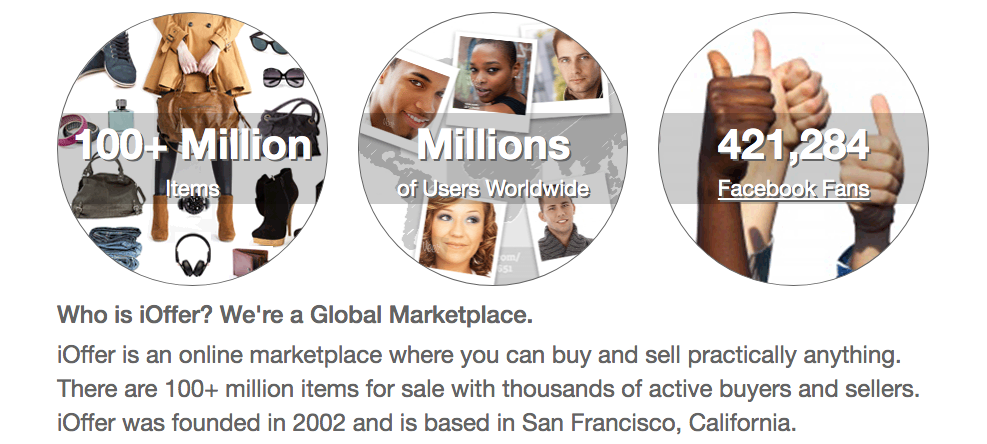Answers

Aug 22, 2019 - 08:22 AM
Since iOffer operates as an “online trading community,” the presence of counterfeit goods isn’t part of the definition of the business. It’s just that when platforms accept a wide variety of sellers, people trying to cash in on selling fakes will inevitably join.
If the prevalence of counterfeits and knock-offs was enough to render a site unsuccessful, Amazon wouldn’t be the behemoth that it is now. While scams and counterfeits plague Amazon and similar large ecommerce marketplaces, the resulting bad press has done little to erode their power. iOffer, it seems, is no exception.

iOffer brands itself as “an online marketplace where you can buy and sell practically anything.” That “practically anything” deliberately leaves plenty of room for interpretation, without actually defining the site as a counterfeit marketplace.
With its model of negotiation, iOffer actually operates more like eBay than Amazon. However, eBay offers significant protection from fraud and scams for buyers and sellers. iOffer doesn’t offer the same protections, and shoppers must buy at their own risk.
This has left iOffer with shockingly low consumer reviews, which definitely makes one wonder how the site is still going. However, many shoppers still take the iOffer risk. And it can be a good place to buy goods, for people who diligently research sellers and read product descriptions carefully.
Like many ecommerce marketplaces, the blame for problems with iOffer orders tends to land on the sellers, not the platform. The site is legit, but many sellers are not. While many people view iOffer as a site that primarily trades in counterfeits and knock-offs, by definition, it’s just a marketplace. It’s the sellers who choose to sell shady goods.

Image via Pixabay
Why Counterfeiting Thrives in U.S. Ecommerce
Counterfeit goods and ecommerce scams thrive on iOffer and similar websites mainly because these vast online marketplaces are so hard to police.
Ecommerce sites have historically avoided liability for products sold by third-party vendors, giving the sites little incentive to try to prevent counterfeits, defective goods, and scams from showing up. If a customer complains, the platform can point out that these kinds of sales go against their policy or terms, and that the seller was in violation of those terms - once more shifting the blame to the third-party seller.
Consumers increasingly seem willing to accept the responsibility for vetting sellers, since these sites won’t do it for them. When a consumer gets scammed or receives an item that doesn’t match the product description, they often think “I should have known better than to order without reading the seller reviews,” not “I can’t believe this site allows scammers.” Ecommerce scams are so common, even on “trustworthy” sites like Amazon, that they’re changing the way people shop. Buyers must do their due diligence or face the consequences.
Since many buyers accept it as a normal part of online shopping, and ecommerce marketplaces don’t put teeth into their anti-scam or anti-counterfeit rules, there’s really no reason for counterfeiting not to remain common on these sites. Also, certain buyers actually want high-quality counterfeit goods, so some turn to iOffer for that specific purpose.

Of course, while marketplaces and buyers are often cool with counterfeit goods, the International AntiCounterfeiting Coalition (IACC) is not. When iOffer shut down earlier this year, it was because the IACC stepped in.
Basically, the IACC halted payment processing on the site, forcing iOffer to shut down. While many consumers seek out counterfeit goods on purpose, brands have an obvious reason to try to stop them. The IACC is a coalition of brands that want intellectual property protection. They use their collective power to prevent counterfeiting as much as possible.
Many IACC members had complained about violations on iOffer over the years, and the organization ended up partnering with Mastercard to put pressure on iOffer by halting its transactions. However, all iOffer had to do to get back up and running was show that it had worked to kick the counterfeit sellers off the site.
Why iOffer Bounced Back
Today, iOffer continues to operate legally, even though scammers and counterfeiters are no doubt still on the platform. iOffer probably has a bigger incentive to keep counterfeit activity to a minimum after the IACC scandal, but the site can’t keep counterfeiters away entirely, even if it wanted to. The marketplace is simply too big to police.
Since iOffer remains a marketplace and nothing more, it’s not responsible for anything beyond kicking scammers and counterfeiters off the site when they pop up. It’s still effectively considered the sellers’ responsibility not to sell fake goods. Even in the U.S., sites aren’t held responsible for the activity of their third-party sellers.
And should they be? Probably not: a site can’t reasonably be expected to police all of its sellers. Even if a marketplace genuinely wanted to prevent all scammers and counterfeiters from joining the site, it likely wouldn’t be able to.
Shoppers can’t realistically want massive ecommerce marketplaces, while also wanting them to be completely free of shady sellers. It’s just not possible. To benefit from the sheer size of the marketplace, consumers compromise by accepting that some subpar sellers will join. So iOffer and similar sites continue to operate in the U.S. without issue, because the popular business model they use is known to inherently involve sellers of questionable merit. To take issue with the counterfeiters and scammers, you’d really have to take issue with the ecommerce marketplace system as a whole.

Aug 27, 2019 - 08:45 AM
It turns out fraud has also become a big problem for Amazon according to this Wall Street Journal article:
Amazon Has Ceded Control of Its Site. The Result: Thousands of Banned, Unsafe or Mislabeled Products
And if Amazon, with all its resources, powerful AI and incredibly smart engineers cannot get a handle on the problem, then it is also incredibly challenging for the iOffers of the world.
The law also seems to be on their side. Per the article:
Amazon’s common legal defense in safety disputes over third-party sales is that it is not the seller and so can’t be responsible under state statutes that let consumers sue retailers. Amazon also says that, as a provider of an online forum, it is protected by the law—Section 230 of the Communications Decency Act of 1996—that shields internet platforms from liability for what others post there. This is similar to a common defense by internet companies faced with complaints about content or services offered on their platforms. Courts and regulators have largely agreed—until recently.But this defense is starting to crack as a Pennsylvania court ruled against Amazon in July 2019 in case where a toy sold by a third-party seller blinded a child. Amazon was found to be responsible especially since the said seller ('The Fury Gang') had disappeared and could not be contacted. Although this was at the state level (not federal) it might pave the way for a broader repeal of the law.

Apr 11, 2020 - 03:01 AM





Add New Comment